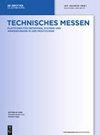基于学习的桶腐蚀检测方法在工业应用中的比较
IF 0.7
4区 工程技术
Q4 INSTRUMENTS & INSTRUMENTATION
引用次数: 0
摘要
基于机器学习(ML)的图像分割可以用于检测工业物体表面的腐蚀。本研究提供了卷积神经网络(cnn)技术与RGB和HSV特征空间内随机森林(RF)分类器技术的比较。基于cnn的方法通常需要大量的数据进行训练,以使网络在新数据上很好地收敛和泛化。由于提供的数据量较少,我们采用了一套方法来提高模型的泛化能力。这些方法可以分为数据增强、大小模型的选择和自监督学习(SSL)等预训练策略。另一方面,RF分类器是按像素进行训练的,因此数据量由图像大小决定。待测对象是一个金属制的桶,桶的外壳图像作为训练数据,桶底图像作为测试数据。我们发现RGB特征空间中的RF分类器在腐蚀类别的f - 1得分方面比cnn高出7个百分点。本文章由计算机程序翻译,如有差异,请以英文原文为准。
A comparison of learning-based approaches for the corrosion detection on barrels in industrial applications
Abstract Machine-learning-based (ML) segmentation in the image domain can be utilized for the detection of corrosion on the surface of industrial objects. This research provides a comparison of techniques using convolutional neural networks (CNNs) on the one hand, and random forest (RF) classifiers within RGB and HSV feature spaces on the other hand. CNN-based approaches usually need a large amount of data for training in order for the network to converge and generalize well on new data. Due to the low amount of data provided, we apply a set of methods to increase the generalization ability of the model. These methods can be categorized into data augmentation, selection of larger and smaller models and pretraining strategies like self supervised learning (SSL). The RF classifiers on the other hand are trained per pixel, so that the amount of data is determined by the image size. The object to be tested is a barrel made of metal, from which the image of the coat is used as the training data, and the image of the bottom as test data. We found that a RF classifier in the RGB feature space outperforms the CNNs by seven percentage points regarding the f 1-score of the corrosion class.
求助全文
通过发布文献求助,成功后即可免费获取论文全文。
去求助
来源期刊

Tm-Technisches Messen
工程技术-仪器仪表
CiteScore
1.70
自引率
20.00%
发文量
105
审稿时长
6-12 weeks
期刊介绍:
The journal promotes dialogue between the developers of application-oriented sensors, measurement systems, and measurement methods and the manufacturers and measurement technologists who use them.
Topics
The manufacture and characteristics of new sensors for measurement technology in the industrial sector
New measurement methods
Hardware and software based processing and analysis of measurement signals to obtain measurement values
The outcomes of employing new measurement systems and methods.
 求助内容:
求助内容: 应助结果提醒方式:
应助结果提醒方式:


